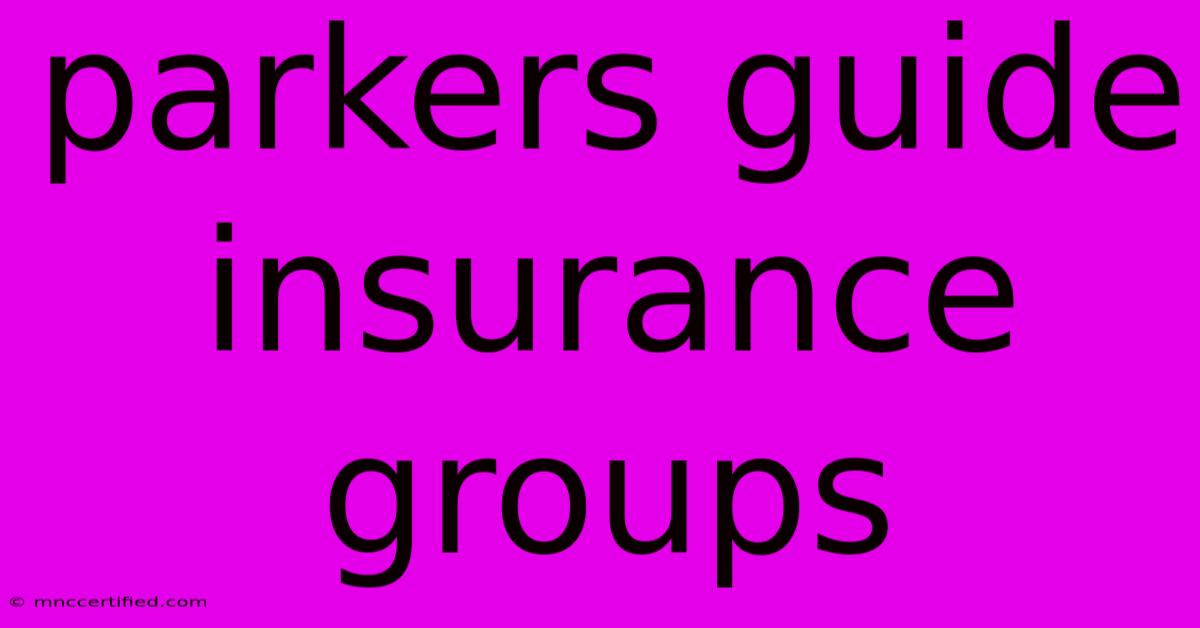Parkers Guide Insurance Groups

Table of Contents
Parker's Guide Insurance Groups: A Comprehensive Guide
Parker's Guide is a widely recognized rating system used by insurance companies in the UK to assess the risk associated with insuring different vehicles. Understanding Parker's Guide insurance groups is crucial for drivers looking to find affordable car insurance. This guide will delve into the intricacies of this system, explaining how it works, what the different groups mean, and how it impacts your premiums.
What are Parker's Guide Insurance Groups?
Parker's Guide assigns each car a numerical rating, ranging from 1 to 50 (though some exceptionally high-risk vehicles may fall outside this range). This number, the insurance group, reflects the perceived risk of insuring that specific vehicle. A lower number indicates a lower risk, resulting in generally cheaper insurance premiums. Conversely, a higher number signifies a higher risk, leading to more expensive premiums.
Several factors contribute to a car's insurance group rating, including:
- Vehicle price: More expensive cars generally fall into higher insurance groups.
- Performance: High-powered engines and faster acceleration often translate to higher insurance groups.
- Security features: Cars with advanced safety features like airbags, anti-theft systems, and stability control may receive lower ratings.
- Repair costs: Cars with expensive parts or complex repairs tend to be placed in higher insurance groups.
- Theft rate: Vehicles with a history of high theft rates are usually assigned higher insurance groups.
- Claims history: A model with a history of frequent insurance claims will likely be in a higher insurance group.
How Insurance Groups Affect Your Premiums
Your insurance group is just one factor influencing your car insurance quote. Other important factors include:
- Your driving history: A clean driving record with no accidents or convictions will lower your premiums.
- Your age and occupation: Younger drivers and certain occupations are often considered higher risk.
- Your location: Insurance premiums vary depending on where you live.
- Your annual mileage: Driving more miles annually generally increases your premiums.
- Optional extras: Adding extras like breakdown cover might slightly increase your premium.
Finding Your Car's Insurance Group
Determining your car's insurance group is relatively straightforward. You can usually find this information:
- In your vehicle's documentation: Check your V5C registration document or your car's handbook.
- On your insurance comparison websites: Most comparison sites will display the insurance group when you search for quotes.
- On the manufacturer's website: Some manufacturers provide this information on their vehicle specifications pages.
Using Parker's Guide to Save Money on Car Insurance
Understanding Parker's Guide allows you to make informed decisions when choosing a car. By opting for a vehicle in a lower insurance group, you can potentially save a significant amount on your premiums over the life of your car. This doesn't necessarily mean compromising on the car's features; it simply means being mindful of factors that influence the insurance group rating.
Beyond the Numbers: Other Factors to Consider
While Parker's Guide is a helpful tool, it's essential to remember it's not the only factor determining your insurance cost. Shop around and compare quotes from different insurers, providing accurate information to get the best possible deal. Don't solely focus on the insurance group; consider other factors mentioned earlier to secure the most suitable and affordable car insurance.
Conclusion: Mastering Parker's Guide for Smart Insurance Choices
Parker's Guide insurance groups provide a valuable framework for understanding the relative risk associated with insuring different vehicles. By understanding how the system works and considering the various factors involved, you can make more informed decisions when buying a car and securing affordable car insurance. Remember to always compare quotes from multiple insurers to find the best deal tailored to your specific circumstances. Don't let the numbers alone dictate your choice; factor in all the elements to ensure you find the perfect car insurance policy for your needs.

Thank you for visiting our website wich cover about Parkers Guide Insurance Groups. We hope the information provided has been useful to you. Feel free to contact us if you have any questions or need further assistance. See you next time and dont miss to bookmark.
Featured Posts
-
Viral Election Petition Small Business Owner
Nov 27, 2024
-
Morrisons Shoppers Confused By Stock Issues
Nov 27, 2024
-
Student Np Liability Insurance
Nov 27, 2024
-
Will Sporting Star Face Arsenal
Nov 27, 2024
-
Buckley Insurance Worcester Ma
Nov 27, 2024